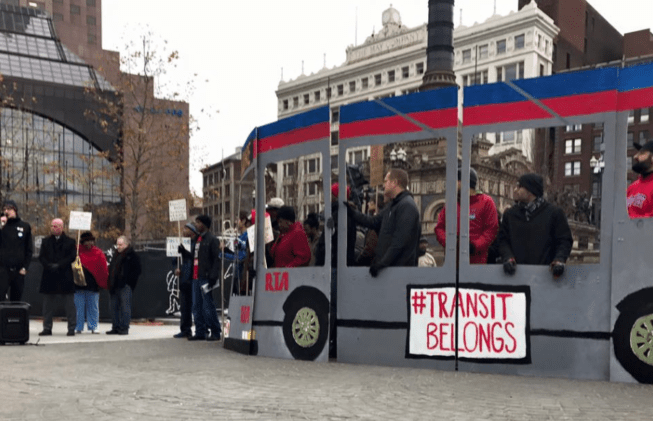There's a big debate happening in Cleveland right now about where buses fit in the city's newly redesigned Public Square. Mayor Frank Jackson and his local media mouthpiece, the Plain Dealer editorial board, have come down firmly on the side of booting buses off the square, even though it's the hub for the regional bus system, with about 20,000 transfers daily.
The redesign has disrupted bus route patterns, slowing down transit trips and making connections much less convenient for bus riders. The bus reroutes also cost the regional transit agency millions of dollars a year, which threatens service throughout the transit system.
Transit advocates have charged that the mayor's decision is all about pleasing affluent visitors who don't want to rub elbows with transit riders when they come to the new park. The mayor's office has countered by saying that pedestrian safety is the paramount concern -- and also, somehow, that allowing buses on the square elevates the threat of terrorism.
But it was the Plain Dealer's knock on "wheezing, block-long buses" in a recent editorial that really rankled local blogger Tim Kovach, who works as an air quality planner. In fact, closing the square to buses will measurably worsen air quality in the region, he says:
Read literally, the PD’s editorial board argues that allowing GCRTA buses to use the dedicated bus lanes on Superior Avenue through Public Square would allow them to belch out diesel exhaust, fouling air quality and damaging the lungs of passersby.
Except that is prima facie absurd. Perhaps the members of the editorial board don’t quite understand how mobile emissions work, but that isn’t it. On the contrary, forcing buses to travel around, rather than through, the Square should produce more emissions, as the buses are forced to drive farther and sit in traffic as they compete for road space with other vehicles. But how much?
Fortunately, I do this sort of thing for a living, so I can estimate the additional bus emissions associated with closing Superior Avenue through Public Square to buses.
According to GCRTA data, roughly 1,445 buses drive through/around Public Square on a daily basis. Because those buses are not able to access their dedicated lanes on Superior Avenue, they are forced to transit another 0.1 miles around East Roadway/West Roadway/Rockwell, adding some 52,754.5 miles per year. Additionally, because the buses are now in traffic, they must travel at reduced speeds and idle as they wait to get back on Superior Avenue.
Kovach calculates that rerouting buses outside the square will lead to between "535.98 and 860.96 tons of carbon dioxide equivalent (CO2e) per year." He concludes:
...while I expected the PD to support the Jackson administration’s choice, they should tread more carefully when it comes to verifiably inaccurate statements. There are no block-long buses hurtling through Public Square, belching out emissions. Just the opposite, in fact.
What we're also reading today: GJEL Accident Attorneys says Oakland's policy of making downtown street parking free around the holidays undermines the city's purported goal of stimulating spending at local businesses. And Seattle Transit Blog asks whether Sound Transit will opt for trains with open gangways, which can carry more passengers, in its next light rail vehicle purchase.




